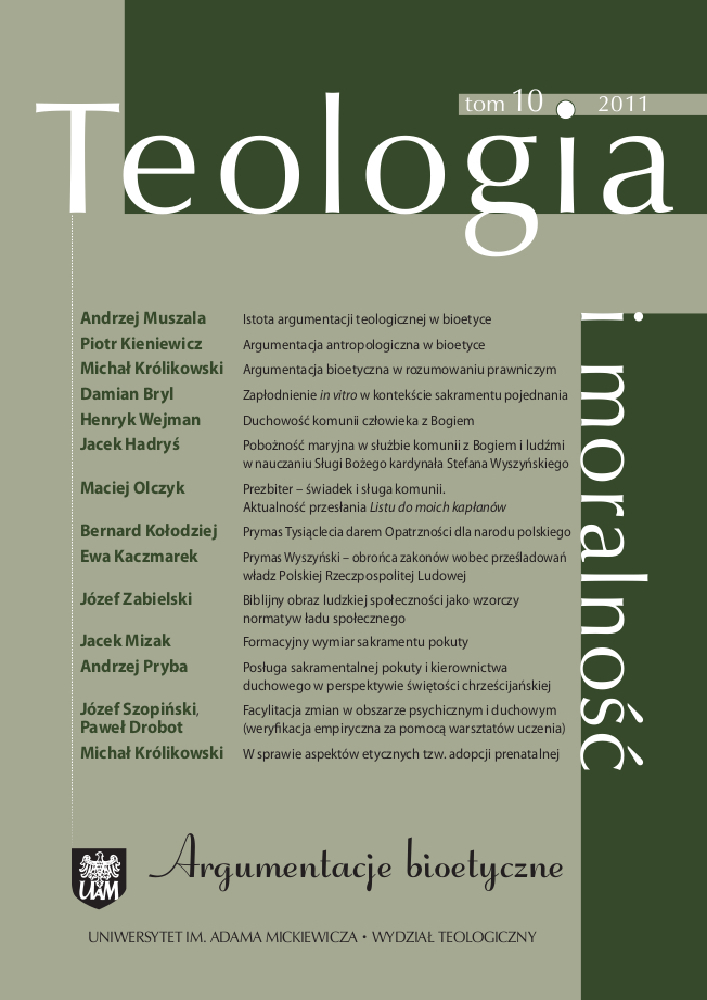Abstract
The practice of extracorporeal „in vitro" fertilization is spreading faster and faster. Persons who participate in many different ways in these procedures and at the same time are unable to evaluate them properly, benefit from the sacrament of reconciliation and penance. What is the way in which the confessor should receive these persons, what conditions have to be accomplished so that an authentic reconciliation with God could take place? The present article is the attempt to show and analyze some fundamental issues relating to the problems connected with „in vitro" fertilization in the context of the sacrament of reconciliation and penance. The analyses pertain to three points. The first one concerns the validity of the sacrament and discusses two main conditions of the sacrament: contrition and atonement; at the same time the need of taking into consideration the moment when the penitent asks for the sacrament with reference to the course of the „in vitro" process is discussed. The second point shows the need of taking into account different determinants on the penitent's part and the influence of these determinants on the awareness and voluntariness of activities undertaken; the author discusses also the problem of the responsibility of different persons involved in artificial fertilization. Last but not least the significance of the confessor's attitude is highlightedReferences
Dziewiecki M., Psychospołeczne kompetencje spowiednika, w: http://sfd.kuria.lublin.pl/index.php?option=com_content&task=view&id=244 [dostęp: 28.05.2011].
Grys K., Problem tzw. nadliczbowych embrionów, cyt. za: www.teologiamoralna.pl [dostęp: 15.05.2011].
Gryz K., Rozgrzeszenie po zabiegu in vitro. Głos w dyskusji, „Teologia i Moralność”, t. VIII (2010).
Jan Paweł II, Evangelium vitae.
Jan Paweł II, Reconciliatio et paenitentia.
Katechizm Kościoła katolickiego.
Kongregacja Nauki Wiary, Instrukcja „Dignitas personae” dotycząca niektórych problemów bioetycznych.
Królikowski J., Antykoncepcja – materia grzechu i duszpasterstwo w konfesjonale, „Currenda” 148 (1998) 1.
Królikowski J., Antykoncepcja materia grzechu i duszpasterstwo w konfesjonale, „Currenda” 147 (1997) 2, w: http://www.currenda.diecezja.tarnow.pl/archiwum/2-97/index.html [dostęp: 10.05.2011].
Orzeszyna J., Teologiczno-moralny aspekt niepłodności w małżeństwie, Kraków 2005.
Papieska Rada ds. Rodziny, Vademecum dla spowiedników o niektórych zagadnieniach moralnych dotyczących życia małżeńskiego, n. 3.2. Por. A. Kokoszka, Vademecum dla spowiedników małżonków,„Currenda” 148 (1998) 1, w: http://www.currenda.diecezja.tarnow.pl/archiwum/1-98/index.html [dostęp: 10.05.2011].
Paweł VI, Humanae vitae.
Paweł VI, Konstytucja „Indulgentiarum doctrina”.
Płatek J.S., Sprawowanie sakramentu pokuty i pojednania, Częstochowa 1996.
Skrzydłowska-Kalukin K., Mówią, że jestem morderczynią, „Dziennik” (12.01.2009), w: http://kobieta.dziennik.pl/twoje-emocje/artykuly/142164,mowia-ze-jestem-morderczynia.html [dostęp: 15.05.2011].
Szyran J., Jak postępować w konfesjonale z grzechami związanymi z zapłodnieniem in vitro?, cyt. za: www.teologiamoralna.pl [dostęp: 15.05.2011].
Teinert T., Jak postępować w konfesjonale z grzechami związanymi z zapłodnieniem in vitro?, cyt. za: www.teologiamoralna.pl [dostęp: 15.05.2011].
Trydencki, Sesja XIV, Sakrament pokuty, r. IV, w: DS 1676; Ordo penitentiae, n. 6.
Witek S., Sakrament pojednania. Podręcznik dla duszpasterzy, Poznań – Warszawa 1979.
Wolski J., Rozgrzeszenie penitenta zaangażowanego bezpośrednio lub pośrednio w procedurę in vitro, w: Poradnik spowiednika, red. P. Góralczyk, D. 33.
Wolski J., Rozgrzeszenie penitenta.
License
All rights reserved
